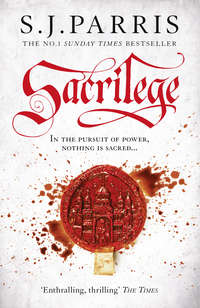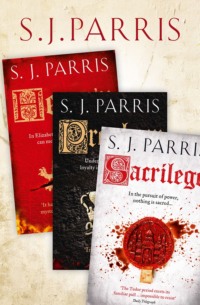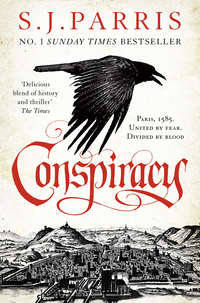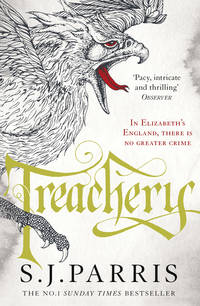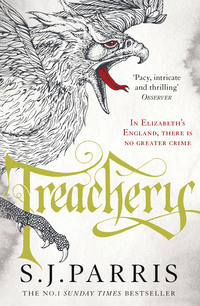
Полная версия
Heresy
‘And yet, in the winter of his life, it seems clear enough to anyone listening that his heart returns to the old faith.’
‘I think, as he nears death, he grows less concerned with the fate of his body and more fearful for his soul,’ Mercer said. ‘Perhaps if we all saw our death so close at hand, we might choose a different course, but alas, while we breathe our fears are all for our poor, weak flesh and our worldly status.’
‘Perhaps so. But it is the son who seems to suffer it most,’ I observed.
‘You have met Thomas? That poor boy. He is a very able scholar, you know. At least, he was.’ Mercer ran both hands over his face as if washing it, a gesture of hopelessness. ‘I have known him since he first came to Oxford at fifteen – before his father left for Rheims, he charged me to care for Thomas like a father in his absence. Edmund understood why I had to act as I did – he forgave me. But Thomas will not forgive me for my part in Edmund’s trial. I have tried to help him – with such gifts of money as are in my power, I mean – but he would rather humiliate himself slaving for that young peacock Norris than accept a penny. When I pass him in the courtyard he does not even acknowledge me, but I feel the hatred burning in him like a furnace.’
‘That is hard,’ I said. ‘But he is young, and the passions of the young are often as brief as they are fierce. Perhaps he will forgive you in time.’
I bowed then and moved towards my staircase, keen to get to work before the hour grew too late. Mercer stepped towards me and grasped my hand.
‘I hope we will have a chance to talk further, Doctor Bruno,’ he said. ‘I am truly glad to have met you, and I hope I did not sound too sanctimonious in my disapproval this evening when we spoke of Agrippa and the Hermetic treatises.’
‘Oh, I am quite used to disapproval,’ I said, waving away his apology with a smile.
‘You mistake my meaning. The rector is a pious man and, as I say, he can be severe when he chooses – it is prudent for those whose position depends on his good opinion to express views that accord with his own when at his table. But I have long had a great interest in these works – as a scholar, I mean, for I believe that one can study the occult philosophies objectively yet still remain a good Christian. Is it not so, Bruno?’
‘Ficino thought so,’ I replied. ‘And I hope he was right, Doctor Mercer, else I am damned.’
‘Please – call me Roger,’ he said warmly. ‘Well, I shall look forward to our next discussion on these matters.’
With that, he bowed and strode away across the courtyard. I turned towards my room just as fat drops of rain began once more to fall from a brooding sky.
FOUR
I read and revised my notes for the disputation until my lamp burned out, and afterwards I slept fitfully; the room was cold and the rain lashed hard against the panes as the timbers creaked. So it was that when I was disturbed by a great noise during a brief slumber I was at first not sure if it was morning or merely a hallucination of my confused dreams. Gradually, though, the noise became more insistent, and as I awakened to see that it was not yet dawn, I realised that the infernal riot outside my windows was the frenzied sound of a barking dog. I pulled the sheet closer around me, cursing the rector or whomever had thought to keep such a feral animal in the college grounds and curled up in the hope of recovering my ruined sleep, when a second sound joined that bestial dawn chorus, one that I have never forgotten and still, sometimes, hear in dreams. It was the blood-chilling scream of a human being in pain and mortal terror, and it rose in pitch and agony as the creature’s barking grew wilder and more vicious.
As the horror of those combined sounds dispelled the last vapours of sleep, I realised that someone not far from my windows was in fear of their life; I supposed it must be some intruder, surprised perhaps by a watchdog, but I could not ignore it, so I hastily pulled on my breeches and a shirt and set out to find the source of this consternation and see if I might offer assistance.
I emerged from my staircase into the shadowy courtyard; the heavy clouds were broken with veins of pale light and the rain, for the moment, had abated, leaving behind a silvery mist that hung thick in the morning air so that I could barely make out the clock on the north range opposite and had to step forward to read its hands: almost five. The dreadful noise of the hound continued and from other staircases around the main courtyard figures appeared through the vapour as young men, with hose pulled on under their nightshirts and hair disarrayed, timidly gathered in groups, whispering to one another, unsure whether to come any closer. The din was unmistakeably coming from the passageway in the east range that led to the rector’s lodgings and the Grove, the Fellows’ garden I had explored the previous evening. Gathering my wits, I ran the length of the passage to the iron gate, where I found two young men pulling at the handle, to no avail, and peering into the misty depths of the garden. Hearing my footsteps, they turned, their faces ashen.
‘Someone is in there, sir, with a wild beast!’ cried the taller. ‘I had just risen to wash when I heard his cries, but from here we can see nothing.’
‘We do not have a key!’ the other said frantically. ‘Only the senior men do, and the door is fast.’
‘Then we must wake one of the senior men,’ I said, wondering how the rector, whose lodgings must have windows on to the garden, could possibly be sleeping through this tumult. ‘You must know where their rooms are – quick, go and wake anyone who could open the gate. Is there another entrance?’
‘Two, sir,’ said the tall student, terrified, while his friend scuttled away up the passage in search of help. ‘Another gate like this from the passage at the other end of the hall, by the kitchens, and a door in the garden wall from Brasenose Lane, but they are all locked at night.’
‘Well, the man in there must have got in somehow,’ I said, urgently, as a throttled voice unmistakeably cried, ‘Jesu, save me! Holy Mother, save me!’ Another scream rent the air, followed by mangled cries for help, then a ferocious growling and a truly inhuman sound, a strangled gurgling that seemed to last for minutes. A small crowd of curious and agitated undergraduates was forming behind us when I heard the rector’s voice crying, ‘Let me through, I say!’
His face was puffy and bleary with sleep, a coat thrown over his nightgown, and he carried in his hand a bunch of keys. He started when he saw me.
‘Oh – Doctor Bruno – what is this ungodly disturbance? Who is within – can you see anything? I tried to look from my windows, but the mist and the trees hide all else from sight.’
‘I can see nothing, but it seems that a wild animal is savaging someone in the garden. He must be helped, and quickly!’
The rector stared at me as if I had just told him a herd of cows had flown over the college; then he collected himself and stepped towards the gate with his keys, but just as suddenly he stopped and turned back to me, his face tight with fear. The terrible snarling and barking continued within, but the human sounds had tailed off. I feared the worst.
‘But – but then it would be folly to enter without a weapon if a wild dog is on the loose!’ the rector stammered. ‘It must be killed – someone must fetch the constable or a serjeant-at-arms, who can bring a crossbow. One of you – quickly!’ he snapped at the crowd of half-dressed boys who stood at the end of the passageway, staring, open-mouthed. ‘Go for the constable – immediately!’ They all looked at one another before a couple of them ran out to the courtyard.
‘Could we not find a stick or a poker, anything? We must go in, Rector – I fear we may already be too late for the poor wretch trapped in there,’ I urged, holding out a hand for the keys.
The rector looked around in panic.
‘But – how could there be a dog in the garden?’ he asked, as if to himself, his brows knit in perplexity.
‘Is it not a watch dog, to keep out intruders?’ I asked, now puzzled myself. ‘Could it not be some thief who has scaled the wall, perhaps?’
‘But there is no watch dog,’ the rector said, his voice tight with panic. ‘The porter has a dog, but it is an old, blind creature that has only the use of three legs and it sleeps in his lodge by the main gate. No one else in college is permitted to keep an animal.’ He shook his head, unable to make sense of the evidence of his own ears; the beast in the garden went on making its hellish noise.
‘Step aside there,’ said a calm voice behind us, and the gaggle of students crowded in the passageway parted to reveal a tall young man with shoulder-length fair hair, dressed incongruously in a fine doublet and breeches, black silk slashed to show a rich crimson lining and topped with an elaborate ruff, looking for all the world as if he were off to a dance or a playhouse in London, not hastily risen like the rest of us in all the confusion. In one hand he carried an English longbow, of the kind the nobility use for the hunt, taller than himself and ornately carved with gilded inlays and green and scarlet tracery. In the other he held a leather quiver of arrows decorated with the same design of curlicued vines and gilt leaves.
‘Gabriel Norris!’ exclaimed the rector, staring at the longbow. ‘What is this?’
‘You must open the gate, Doctor Underhill,’ commanded the young man, ‘there is no time to lose, a man’s life is in danger.’
He spoke in measured tones, despite the urgency of the situation, as if he and not the rector held the authority here; half-dazed, the rector unlocked the gate and the young man stepped through, fitting an arrow to his bow as he did so. I followed him hesitantly, and the rector fell in behind me, keeping close to the wall.
The mist hung heavily between the twisted trunks of the apple trees, playing tricks on my eyes with its shifting shapes. Stepping cautiously through the blue shadows, I glimpsed suddenly towards the furthest north-east corner the movement of a large, long-legged dog – by its shape a wolfhound of sorts, I thought, though I could not see clearly. I kept close to the wall as this Gabriel, conspicuous in his gaudy clothes, advanced in steady paces towards the animal, which was still growling and shaking between its teeth a limp black object at its feet. As I moved closer, the mist thinned and I was able to see the animal clearly; its jaws were bloody and daubed with shreds of torn flesh. My heart sank then and my stomach convulsed, for I knew we were too late. The young man paused a few paces away; the dog, catching a scent or a sound, paused in the mauling of its prey and raised its head. For the briefest moment, its snarling ceased and it made a movement towards the young man; as it did so, he let the arrow fly. He was a good shot, despite the thick air, and the animal crumpled to the ground as the arrow-head tore through its neck.
As soon as it fell, Gabriel dropped his bow and we both rushed to the black heap that lay up against the wall, beside the animal’s corpse. It was the body of a man, lying face down, his black academic gown spread out around him, the grass all torn and soaked with a quantity of blood around the body. I helped Gabriel roll the man over, and cried out suddenly in shock. Here was Roger Mercer, his head bent at a hideous angle, eyes staring to the sky, his throat quite torn out – a flap of flesh hung open, raw tissue protruding from the wound. Instinctively I reached out to staunch the blood that still seeped down his neck and breast, but it was too late – the eyes were motionless, fixed forever in a stare of terror. Gabriel Norris jumped back from the bloody corpse, checking anxiously to see that he had got no gore on his clothes, as if this were his only concern. Preening little peacock, I thought in disgust – then remembered where I had heard his name before; Mercer himself had referred to him the night before in exactly the same terms. I crouched in disbelief by the body, taking in the ravaged hands – two of the fingers near bitten off where he had tried to fight the animal away – the chunks of flesh torn from the legs and ankles where it had dragged him to the ground, that horrifically mauled gullet.
The rector came cautiously towards us, a handkerchief clutched over his mouth.
‘Is he …?’
‘We came too late, God have mercy on his soul,’ I said, more from custom than piety. The rector moved close enough to identify the mutilated body of the man who had sat at his right hand only the night before at dinner, and was immediately sick. The young man called Gabriel seemed to have recovered himself, and was probing the corpse of the dog with his toe.
‘A giant of a beast,’ he said, with a note almost of pride, as if he were displaying it as a hunting trophy. Peering more closely, it struck me: hunting was the apt image.
‘This is a hunting dog,’ I said, kneeling beside it. ‘And look, here.’ I pointed to where its ribs protruded painfully under its wiry grey pelt. ‘See how thin it is – it looks as if it was starving. And look at its leg.’ A ring of raw flesh ran around the top of the dog’s left hind leg where the skin had been brutally chafed by a tether of some kind. The fur around the wound was patchy and torn, as if the dog had tried repeatedly to tear off its fetter with its own teeth. ‘It has been chained up, I think – you see? No wonder it went so crazed.’
‘What was it doing in the garden, though?’ the young man asked, looking at me expectantly. ‘And why was Doctor Mercer here with a dog?’
‘Perhaps he was walking his dog and it suddenly turned on him – dogs are sometimes unpredictable,’ I suggested, unpersuaded by my own hypothesis.
‘But Roger didn’t have a dog,’ the rector said in a weak voice, wiping his mouth with his handkerchief. ‘I told you – no one in the college, save the porter, is allowed to keep an animal. No – no, gentlemen, there is nothing to see here!’ he cried suddenly, as the scholars began crowding through the narrow gate into the garden, intent on seeing the spectacle. ‘Back to your rooms, all of you! Chapel at six as normal – back to your rooms and make yourselves ready, I say!’
The students reluctantly turned and shuffled back through the gate, casting glances over their shoulders and murmuring among themselves in animated tones. The rector turned then to the young man, who stood contemplating the corpses, the quiver still dangling from his shoulder; an expression of disbelief spread over the rector’s face, as if he were only now seeing the young man clearly for the first time.
‘Gabriel Norris!’ he exploded, flapping a hand frantically. ‘What in God’s name are you wearing?’
Norris looked down at his flamboyant doublet and hose, then shifted his feet as if embarrassed.
‘I think now is not the time, Doctor Underhill,’ he began, but the rector cut him off.
‘You know perfectly well the Earl of Leicester’s edict about the rules of dress for undergraduates! And I am charged with enforcing it – would you have us both disciplined by the Chancellor’s Court, after all that has happened?’ His face had turned the shade of beetroot, his voice strangulated; I could not help but think that this was an overreaction, in the circumstances. ‘No ruffs, no silks, no velvets, no cuts in doublet or hose!’ he continued, his pitch rising with every item. ‘And no weapons! You deliberately flaunt every rule laid down regarding apparel! This is a community of scholars, Master Norris, not some ball at court for you to flaunt your wealth!’
The young man pursed his lips and looked surly. Even in this attitude of petulance, I saw that he was exceptionally handsome and was clearly used to having his own way.
‘This community of scholars could not do without my wealth, as you well know, Rector. And you overcharge us as it is – I am forced to eat like a pauper here, must I also dress like one?’
The rector, chastened, lowered his voice.
‘You must dress as the Earl of Leicester deems fitting for an Oxford man,’ he said. ‘Now please make haste and change – if you are reported we will both be in trouble and how shall I explain …?’ He broke off there, looking around him helplessly at the two bodies, and I saw that his hands were shaking badly; I suspected he was in shock.
Gabriel Norris looked at me for a moment, as if reluctant to leave the scene of his heroism, then perhaps thought better of it and with some haste picked up his bow and turned to go.
‘Master Norris!’ the rector called after him.
The young man turned defiantly.
‘Yes, Rector?’
‘A longbow? Why in the Lord’s name do you even have a bow and arrows in college?’
Norris shrugged.
‘My father left it to me. It is a keepsake. Besides, hunting for sport is permitted to those commoners who have a licence.’
‘It is not permitted to keep a longbow in college rooms,’ the rector said weakly.
‘If I had not had it in college, you would have had to wrestle that dog with your bare hands, Rector,’ Norris replied drily. ‘But I do not expect you to thank me.’
‘Nevertheless, Master Norris, I insist that you take it to the strongroom in the tower where it can be held for safekeeping. Ask Master Slythurst or Doctor Coverdale to lock it away for you. Today, please!’ he added, as Norris disappeared through the open gate.
The rector took a deep breath and then his legs seemed to buckle under him; I offered my arm and he leaned on me gratefully.
‘Rector Underhill,’ I said gently, indicating Mercer’s body, ‘a man has died in a horrific accident, and we must try to understand how this could have come to pass. If indeed it is an accident,’ I added, for the circumstances troubled me the more I looked for an explanation.
The rector stumbled then, and almost fell against me, his face blanched.
‘Dear God, you are right, Bruno. The reports will spread like wildfire among the students. But how can it be explained? Unless …’ There was terror in his face and I felt sorry for him; his calm, ordered little kingdom upended in a few minutes.
‘Well, let us look for the most likely causes first,’ I said. ‘If there are no dogs in the college save the porter’s old hound, this one must have found its way in from the outside, most likely through this gate.’
‘Yes – yes, that’s it, some feral stray, found its way in through the gate.’ The rector grasped at the suggestion gratefully.
Mercer had fallen and been savaged only yards from the wooden gate into the lane behind the college, but when I went to try the handle, it was locked fast. The rector stood as if transfixed by the bodies of the hunter and his prey. On the back wall nearby I noticed a scrap of black material spiked on the edge of a brick; below this spot the grass was churned to mud with boot and paw prints, and splashed liberally with Mercer’s blood.
‘It looks as if he tried to scale the wall, poor man,’ I said, half to myself. ‘That would account for the mauling of his legs. But it is twice the height of a man – why did he not simply run towards the gate to escape? Unless the dog was between him and the gate, meaning it must have come in from outside. But then, how is the gate locked?’
I glanced at the rector, who remained immobile, then I ran to try the second gate into the college, from the passage that ran between the hall and the kitchens. This too was locked. How, then, I puzzled, had the dog entered the garden? And how, for that matter, had Roger Mercer?
I walked back to where the bodies lay.
‘Is it possible,’ I ventured, as the reality of what I had seen began to solidify in my mind, ‘that someone could have let the dog in deliberately?’
The rector turned to look at me incredulously.
‘As a prank, you mean?’
‘Hardly a prank. Whoever unleashed a half-starved hunting dog must have known it could kill.’ I knelt down by Mercer’s mauled body and patted the pockets.
‘Doctor Bruno!’ the rector exclaimed. ‘What are you about? The poor man is still warm, if you please.’
Roger Mercer had been fully dressed, despite the early hour; in one of the pockets sewn into his breeches I found what I had been looking for.
‘Here,’ I said, holding up two iron keys attached to a single ring, one much larger than the other. ‘Is one of these a key to the garden?’
The rector took the ring from my hand and examined the keys against the light.
‘Yes, the larger would open any of the three gates.’
‘Then either he let himself in and locked the gate behind him, or someone locked the gate through which he entered once he was inside,’ I reasoned. ‘Either way, he was trapped in here with a savage dog.’
‘But we still don’t know how the dog got in,’ the rector said, uncomprehending.
‘Well, we know it didn’t jump the wall, and it didn’t let itself in and lock the gate after it.’ I looked him directly in the eye as I spoke, waiting for understanding to take effect.
The rector clutched my arm, his face twisted with panic; I could smell the bile on his breath.
‘What are you saying, Bruno? That someone let that dog in and then closed every means of escape?’
‘I can’t see another explanation,’ I said, looking again at the dog’s fearsome teeth, through which its limp tongue now lolled, spittle hanging in tendrils from its jaws. Norris’s arrow stuck upright from its gullet. ‘Someone who knew Doctor Mercer would come here at this hour. But surely he never suspected any harm would come to him, else he would have armed himself.’
Then I remembered Mercer’s strange remark the previous night, about how we might all live differently if we saw death approaching. I had dismissed it, but had he been revealing that he feared for his life? Unhappy coincidence only, I guessed; besides, he had spoken confidently of attending the disputation, and of conversing with me later. I felt a sudden awful sorrow; though I hardly knew the man, he had seemed warm and genuine, and I had stood by only minutes ago and listened to him die. To think that he might have been saved if I had acted quicker, if someone had had a key, if Norris had arrived sooner with his bow. One moment of indecision decides a man’s fate, I thought, and realised that I too was trembling.
‘Was it perhaps his regular practice to walk in the garden so early?’ I asked. ‘I mean, could someone have known to expect him here?’
‘The Fellows often like to read in the quiet of the Grove,’ the rector said. ‘Though not usually at this hour, I grant you – it is too dark. The undergraduates usually rise at half past five to make themselves ready before chapel at six – morning service is compulsory. There is rarely a soul abroad in the college any earlier, not even the kitchen servants. I confess I have never walked in the garden at such an hour so I could not say if any of my colleagues had the habit of doing so.’
As I bent again to Mercer’s body, separating the bloodied and torn clothes to see if anything on his person might explain his presence in the Grove so early, I remembered how he had joked about the garden being popular for trysts. Had he been expecting someone who never came, or who came and brought death with them? He carried no book, but a bulge inside his doublet suggested a hidden pocket; reaching in, I withdrew a fat leather purse that jingled with coins.
‘If his purpose was a quiet, contemplative walk before sunrise, surely he would not have needed to bring this,’ I said, untying the purse and showing the rector its contents. The English coins meant nothing to me, though there were clearly a lot of them, but the rector’s eyeballs bulged at the sight.
‘Good God, there is at least ten pounds here!’ he exclaimed. ‘Why would he carry such a sum?’
‘Perhaps he expected to meet someone to whom he owed money.’
‘And knowing he would be here, they set a dog on him!’ he exclaimed, his eyes wide. ‘Revenge for a bad debt, that must be it.’
I shook my head.
‘Then why is the money still in his pocket? If someone had wished to harm him for failure to pay a debt, surely they would have made sure to take the money first?’


